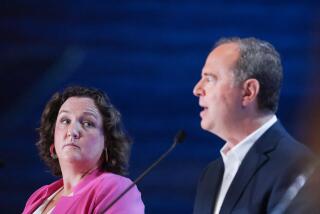Charity Doesn’t Begin at the Public Till : Hypocrisy: Liberals accuse Republicans of parsimony. But how compassionate are they with their own money?
- Share via
Al Gore, scourge of “Robin Hood in reverse” Republicans who take from the poor and give to the rich, has himself done quite well in the area of accumulating personal wealth. Last year, the vice president earned $414,705, $259,013 of which came from lucrative sales of his best-selling book, “Earth in the Balance.”
What’s curious is that Gore and his wife claimed no itemized deductions. They took the $6,350 standard deduction, apparently because it was more than they had in itemized deductions. Gore’s spokeswoman refuses to say whether he gave anything to charity.
It’s not that Gore doesn’t care for those in need. Indeed, I believe that, in his mind, he is giving. It’s just that he has delegated his generosity to the state. When the vice presidential head hits the pillow at night, it can rest easy in the comforting knowledge that a lifetime of compassionate energy has been devoted to prodding the federal government to be ever more generous with other peoples’ money. Furthermore, after having forked over a hefty 35% of their adjusted gross income in federal taxes ($142,688), perhaps the Gores felt that they had given enough.
Gore’s earnings place him in the top 1% of income earners. And yet it never occurred to him that there might be something incongruous with the image of one of the wealthiest men in America (remember, according to the Democrats’ class warfare manual, anyone with an income above $75,000 is “rich”) advocating generosity with taxpayers’ money but exercising stinginess with his own.
The publication of Gore’s tax return provoked no reaction from a press corps ordinarily insatiable for instances of hypocrisy among public officials. Why? Because identification of generosity with government programs runs so deep that all a public figure has to do is advocate greater spending on the poor and his compassion credentials are beyond reproach.
Only a comprehensive, relentless campaign can change this moronic equation and reframe the compassion debate in terms of our personal responsibility toward the less fortunate. Those who wish to replace the welfare state with local solutions will not succeed unless political reforms are supported by cultural reforms--a parallel shift in attitudes, values and in our understanding about how to practice effective compassion.
To bring about this change, we must be prepared to use every weapon in our cultural arsenal, including shame. A year from now--we’re giving everybody advance notice--the Center for Effective Compassion will release a roster of what public figures who make more than $200,000 a year gave to charity. The list will include not just politicians, but business people, entertainers and prominent journalists. Wouldn’t you like to know how much Barbra Streisand, Sam Donaldson or Lee Iaccoca gave to charity? If they do not make their charitable contributions available, we will simply include them on a “missing in action” list. The release will be accompanied by a Hypocrisy Index: the correlation between public statements exhorting greater spending on the poor and the actual amount these advocates gave personally.
“From whom much is given, from him that much more will be expected,” is a powerful biblical statement that seems all the more urgent in the face of the staggering social challenges that face us. The way to turn it into reality is to use the power of our culture to move hearts and change minds. The “designated driver” campaign reduced drunken-driving fatalities by a third, without a single bill being introduced and without a dollar of taxpayer money being spent. It’s time for a “designated giver” campaign, with each of us designating ourselves--not the government or the professional altruists--to give money, to give time, to give what it takes to rebuild our communities.
More to Read
Get the L.A. Times Politics newsletter
Deeply reported insights into legislation, politics and policy from Sacramento, Washington and beyond. In your inbox twice per week.
You may occasionally receive promotional content from the Los Angeles Times.










